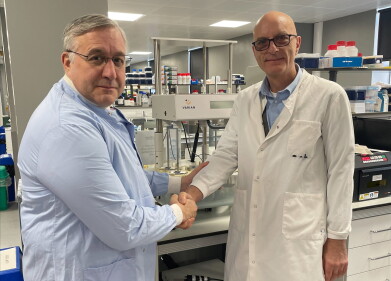News
Pattern Tracing Methods Help in Cancer Prediction
Sep 28 2014
Scientists at the Institute of Food Research (IFR) are using a new approach to understanding how epigenetic marks, or changes to our genome, relate to the risk of developing cancer. With many different types of epigenetic marks occurring at thousands of sites across the genome understanding their significance relies on the use of mathematical techniques.
Machine learning, which involves looking for patterns in a set of training data is one technique that can be used to generate models that predict independent data. Dr Thomas Wilhelm of the IFR, used a modified application of this technique to epigenetic data on cervical cancer using publicly-available case-control data of DNA methylation in women at various stages of developing cervical cancer to look for patterns that indicated a predisposition to the condition. The human papilloma virus (HPV) is the major cause of cervical cancer, but not every woman infected with it goes on to develop cancer.
Instead of developing one model from the training data, his technique involves developing hundreds of diverse models, and applying these to independent, unseen data, and seeing which models work best in their ability to predict outcomes. This avoids ‘overfitting’ of a model to a specific training data set.
Dr Wilhelm “We saw clear patterns of DNA methylation markers that predicted the development of cervical cancer,” said Dr Wilhelm. “Intriguingly, the patterns still predict development of the condition even in women who hadn’t been infected with HPV.”
Dr Wilhelm has already started a new collaborative project to develop a clinical test for triage of HPV infected women for further treatment. Two more projects about risk prediction of bowel and prostate cancer are being developed.
One finding from the study seems to indicate that epigenetic patterns are actually linked to a predisposition to HPV infection itself. Dr Wilhelm is now looking to collaborate with virologists to follow up this new theory and uncover any more evidence of a link between epigenetics and virus susceptibility.
Reference: Phenotype prediction based on genome-wide DNA methylation data, Thomas Wilhelm, BMC Bioinformatics 2014, 15:193 doi:10.1186/1471-2105-15-193
Digital Edition
Lab Asia 32.2 April
April 2025
Chromatography Articles - Effects of small deviations in flow rate on GPC/SEC results Mass Spectrometry & Spectroscopy Articles - Waiting for the present to catch up to the future: A bette...
View all digital editions
Events
Apr 09 2025 Tokyo, Japan
Apr 22 2025 Hammamet, Tunisia
Apr 22 2025 Kintex, South Korea
Analytica Anacon India & IndiaLabExpo
Apr 23 2025 Mumbai, India
Apr 23 2025 Moscow, Russia



















